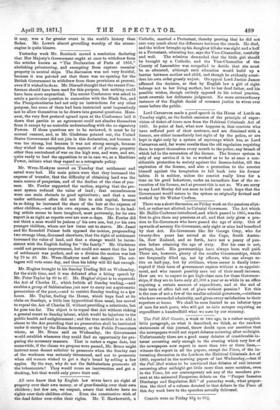Yesterday week Mr. Bentinck moved a resolution declaring that Her
Majesty's Government ought at once to withdraw from the articles known as "The Declaration of Paris of 1856," abolishing privateering, and exempting from capture enemies' property in neutral ships. The discussion was not very fruitful, because it was pointed out that there was no opening for the British Government to withdraw from these provisions at present, even if it wished to do so. Mr. Disraeli thought that the recent Con- ference should have been used for this purpose, but nothing could have been more unpractical. The recent Conference was asked to settle a particular question in connection with the Black Sea, and the Plenipotentiaries had not only no instructions for any other purpose, but some of them had been instructed most imperatively not to allow themselves to be drawn into general questions. More- over, the very first protocol agreed upon at the Conference laid it down that parties to an agreement could not absolve themselves from it except by an amicable understanding with the co-signatory Powers. If these questions are to be reviewed, it must be by mutual consent, and, as Mr. Gladstone pointed out, the United States Government did not join in this declaration, not because it was too strong, but because it was not strong enough, because they wished the exemption from capture of all private property other than contraband of war on the high seas, and were, and are, -quite ready to lead the opposition to us in case we, as a Maritime Power, initiate what they regard as a retrograde policy.


































 Previous page
Previous page